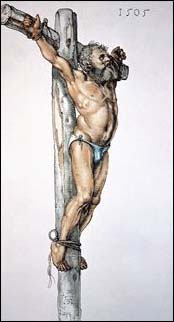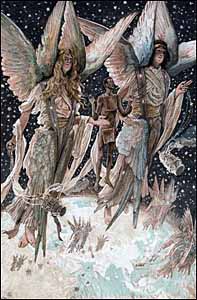
|
Podcast

|
Maturity
Encouragement
Good News
Church
Communion
Prayer
Christian Symbols
Scholarly Articles
Miscellany

|
Easter
Thanksgiving
Pentecost
Stations of the Cross

|
New Testament
Gospels
Acts
Paul's Letters
General Letters
Revelation
Topical Studies

|
Bible Studies
Articles
Books
Podcasts
Search
Menu
Donate
About Us
FAQ
Contact Us
Site Map
The Thief on the Other Cross: A Good Friday Monologue
by Dr. Ralph F. Wilson
Audio (6:44)
 Albrecht Dürer, "The Good Thief" (1505), watercolor, Albertina Graphic Collection, Vienna. |
I am — I was — an armed robber, I guess you'd call it. Me and Jake and the others would live in caves in the Judean hills near the road from Jerusalem to Jericho. We made our living by violence. We wouldn't take on people in the big groups that passed. They traveled together for safety. But a family alone would be an easy mark, as well as anyone fool enough to travel by himself.
Brandishing a strong staff would usually do the trick. Threaten them with a beating and they'd give up without much of a fight. But I've been known to break a few bones in my day, God forgive me. I don't think I actually killed anyone, but then I never stayed around long enough to find out.
The first time I meet Jesus is when I am invited to a party in his honor in Jericho at the home of a rich tax collector named Zacchaeus. I am introduced, we shake hands, and Jesus looks me in the eye for a long moment. He can see right into me, who I am, every crime I have ever committed. Then he smiles this big friendly smile. "You know," he says, "there's forgiveness for you in my Kingdom. How about it?"
I drop my eyes, say something non-committal, and shuffle away. The next day I'm in the crowd, hanging on every word he says. Jesus is talking about his Kingdom, comparing it to a mustard seed, calling it the Kingdom of Heaven. I want so much to go up to him after he has finished and take him up on that forgiveness thing, but I just can't bring myself to do it.
I wish I had. It isn't much later when me and my friend Jake -- the guy on the third cross -- get caught by a Roman patrol. The others run off, but they catch us, beat us silly, drag us into Jerusalem, and throw us in prison. No mercy for the likes of us.
And so it happens that on the same day that they crucify Jesus, they crucify me and Jake -- one of us on his left, the other on his right. This isn't any normal crucifixion. Mobs of people are there just because of Jesus. Self-righteous Pharisees are swaggering and mocking. "If you're some kind of messiah," one sneers, "come on down from that cross. If you're a savior, save yourself — if you can!"
Jake begins cat-calling, too, if you can imagine that. I yell over at him, "You miserable thug, don't you have any fear of God? Can't you see that we're going to die just like he is? Show a little decency! We're getting exactly what we deserve, but he ain't done nothing wrong."
Jake quiets down and the Pharisees lose interest. But I can't get Jericho out of my mind. I can't forget Jesus' eyes, his words, his invitation. And so I call over to him, though it's getting hard to breathe and talking makes it that much harder.
"Jesus!" I say. He turns his head towards me. "Jesus, I was there in Jericho. I met you at a party at Zacchaeus' house. Remember?"
He looks at me for a moment and then nods his head just a little. He does remember.
"I never forgot what you said. I wanted to say yes, but just couldn't. And now look at me — look at us!"
 James J. Tissot, "The Soul of the Penitent Thief in Paradise" (1896). Larger image. |
He is in bad shape — exhausted, in excruciating pain, back oozing, breath labored. He isn't going to last long. I can see that. But somehow I can see beyond all that. He was the Messiah, is the Messiah, no matter what those priests and Romans and Pharisees have done to him. And when he dies, he will be with God. In a few hours, maybe less, he will be vindicated. He will reign in that Kingdom he told us about.
"Jesus," I call again, quieter now.
He opens his eyes. They are the same eyes, the same piercing, loving, honest eyes.
"Jesus," I say, "when you come into your Kingdom, would you remember me?"
His words are labored, his lips parched, but I can still hear him pretty well. "Truly, I say to you...." His voice cracks, then is stronger for a moment. "Truly, this very day you will be with me in Paradise."
His eyes droop. He is fading quickly now. But I believe him. I do! That's what gets me through those next few hours until they break my legs to kill me. I do believe him!
And then I find myself here in heaven, in Paradise. I sure don't deserve to be here, but here I am anyway. I guess that's what a man like me gets when the King himself grants a pardon. Full forgiveness. Pretty amazing, don't you think?
This story is fictional, of course, though it is based on the account in Luke 23:32-43. The criminals described by the Greek word lestes, "robber, highwayman, bandit." Since Josephus used this as a derisive term to refer to the Zealots, some have thought that it might mean "revolutionary, insurrectionist, guerrilla" here. (lestes, BDAG 594; K.H. Rengstorf, lestes, TDNT 4:257-262). However, in this story I take the thief as a highwayman or bandit, like the one who had robbed the man in Jesus' Parable of the Good Samaritan (Luke 10:30-37).
Copyright © 2026, Ralph F. Wilson. <pastor![]() joyfulheart.com> All rights reserved. A single copy of this article is free. Do not put this on a website. See legal, copyright, and reprint information.
joyfulheart.com> All rights reserved. A single copy of this article is free. Do not put this on a website. See legal, copyright, and reprint information.

 To be notified about future articles, stories, and Bible studies, why don't you subscribe to our free newsletter, The Joyful Heart, by placing your e-mail address in the box below. We respect your
To be notified about future articles, stories, and Bible studies, why don't you subscribe to our free newsletter, The Joyful Heart, by placing your e-mail address in the box below. We respect your